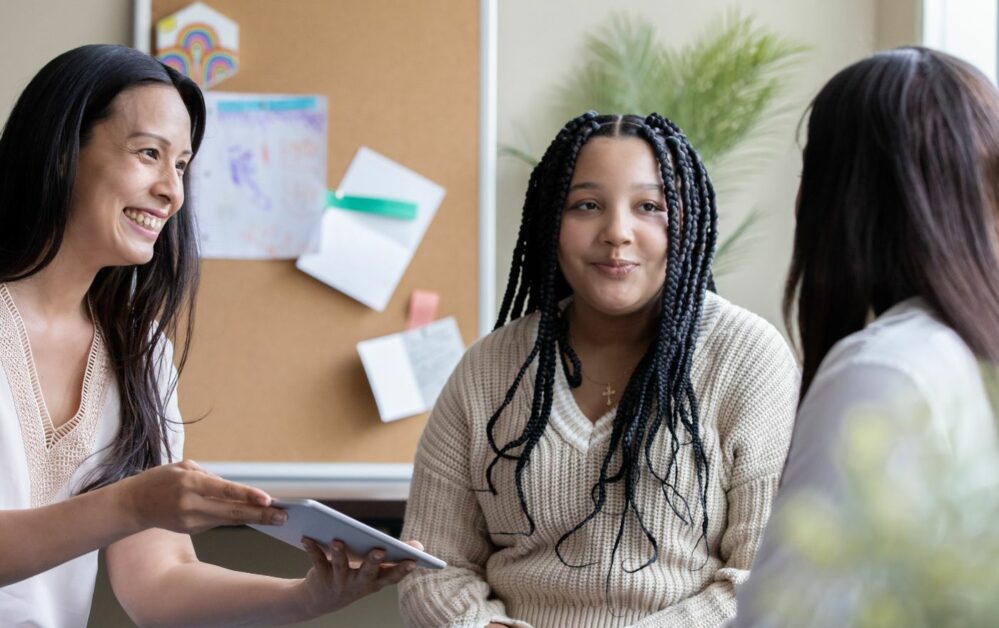
24 Aug Building Social Confidence: Social Coaching for Middle and High School Students in NYC
BUILDING SOCIAL CONFIDENCE: SOCIAL COACHING FOR MIDDLE AND HIGH SCHOOL STUDENTS IN NYC

Adolescence is a transformative phase filled with growth, self-discovery, and social interactions that shape one’s identity. In this dynamic landscape, social coaching emerges as a powerful tool to equip students with the skills, confidence, and emotional intelligence needed to navigate the complexities of relationships, communication, and personal development.
Middle and high school years are pivotal in shaping a young person’s social competence. Social coaching recognizes that each student’s journey is unique, and that acquiring strong social skills goes beyond mere popularity. It’s about fostering empathy, effective communication, resilience, and self-assuredness – qualities that contribute not only to social success but also to overall well-being.
This blog will explore the various facets of social coaching. From building meaningful connections and managing conflicts to understanding nonverbal cues and boosting self-esteem, our aim is to provide insights, strategies, and real-life examples that showcase the transformative impact of social coaching on adolescents’ lives.
Signs a Teen Needs Social Coaching
Recognizing when a teenager could benefit from social coaching is crucial for providing them with the support they need to navigate social challenges effectively.
Here are the top 10 signs that indicate a teen might benefit from social coaching:
- Social Isolation: If a teen consistently withdraws from social interactions, avoids group activities, or prefers solitude, it could signal a need for social coaching to help them connect with others.
- Difficulty Making Friends: Teens who struggle to form and maintain friendships, frequently feel left out, or face challenges in joining social circles may benefit from social coaching.
- Poor Communication Skills: If a teenager has trouble expressing themselves clearly, understanding others, or engaging in conversations, social coaching can enhance their communication abilities.
- Misreading Social Cues: Teens who often misinterpret body language, facial expressions, or social cues, leading to misunderstandings, may benefit from learning to navigate these cues effectively.
- Struggles with Conflict: If a teenager has difficulty resolving conflicts, managing disagreements, or expressing their needs without causing tension, social coaching can provide conflict resolution skills.
- Low Self-Confidence: Teens with low self-esteem, lack of self-assurance, or negative self-perception might benefit from social coaching to build their self-confidence.
- Peer Pressure Challenges: If a teen struggles to resist negative peer pressure, conforming to behaviors they’re uncomfortable with, social coaching can empower them to make confident choices.
- Difficulty in Group Settings: Teens who find it hard to participate in group discussions, collaborate on projects, or feel overwhelmed in social gatherings could benefit from coaching to thrive in such situations.
- Anxiety in Social Situations: If a teenager experiences anxiety, nervousness, or discomfort in social settings, social coaching can equip them with strategies to manage their emotions and build confidence.
- Transition Struggles: Teens facing challenges when transitioning to new schools, environments, or social circles might need coaching to adapt, make connections, and navigate changes successfully.
Recognizing these signs and seeking appropriate social coaching can empower teens to develop essential social skills, foster positive relationships, and navigate the complexities of their social world with greater confidence and ease.

Benefits Of Social Coaching For Middle And High School Students
Social coaching offers middle and high school students a host of invaluable benefits that support their social and emotional growth. Through tailored guidance and instruction, students acquire essential life skills that empower them to navigate the complex web of social interactions with confidence and grace. They develop effective communication skills, learning to express themselves clearly and respectfully while understanding the nuances of nonverbal cues.
Social coaching fosters the art of active listening and empathy, enabling adolescents to forge meaningful connections based on mutual understanding.
Moreover, the ability to navigate conflicts constructively equips students with valuable tools for resolving differences and fostering harmonious relationships. As adolescents develop these skills, they gain self-assurance and resilience, enabling them to handle challenges, peer pressures, and transitions with greater ease.
Beyond the immediate benefits, social coaching sets a foundation for future success by instilling skills like teamwork, conflict resolution, and networking—essential qualities for thriving academically, professionally, and personally.
Ultimately, social coaching empowers middle and high school students to cultivate strong social aptitude, enhancing their well-being and laying the groundwork for a fulfilling and prosperous future.
How Social Coaching For Middle And High School Students Is Conducted?
The process of social coaching for middle and high school students is a structured journey aimed at equipping adolescents with essential social skills, enhancing their self-confidence, and fostering positive interactions.
Here’s an overview of the typical process:
- Initial Assessment:
– Conduct an assessment to understand the student’s current social skills, challenges, strengths, and goals.
– Build rapport and establish a comfortable relationship between the coach and the student.
- Goal Setting:
– Collaboratively set clear and achievable social goals with the student.
– Define what success looks like for the coaching journey.
- Customized Coaching Plan:
– Develop a personalized coaching plan based on the assessment and goals.
– Outline the specific skills, strategies, and activities to be covered.
- Session Scheduling:
– Schedule one-on-one coaching sessions at regular intervals.
– Ensure a consistent schedule to maintain continuity and progress.
- Skill Development:
– Work through various social skills such as effective communication, active listening, empathy, and assertiveness.
– Introduce concepts like reading social cues and managing conflicts.
- Role-Playing and Practice:
– Engage in role-playing exercises to simulate real-life social scenarios.
– Practice new skills in a safe environment, receiving guidance and feedback from the coach.
- Feedback and Reflection:
– Provide constructive feedback after each session to reinforce learning.
– Encourage the student to reflect on their progress and insights gained.
- Self-Confidence Building:
– Address self-esteem and self-confidence, helping the student recognize their strengths and uniqueness.
– Explore strategies to project a positive self-image.

- Emotional Intelligence:
– Teach emotional intelligence, helping the student manage emotions and handle stress effectively.
– Develop empathy and the ability to understand others’ feelings.
- Real-Life Application:
– Encourage the student to apply learned skills in real-life situations, both within and outside coaching sessions.
– Support the student in navigating challenges and celebrating successes.
- Progress Monitoring:
– Regularly assess the student’s progress against the established goals.
– Adjust the coaching plan as needed based on progress and feedback.
- Parent Involvement:
– Keep parents informed about their teen’s progress, challenges, and achievements.
– Provide resources and guidance to parents for supporting their child’s social development.
- Gradual Independence:
– As the student gains confidence and proficiency, encourage them to independently use their skills in various scenarios.
- Long-Term Impact:
– Highlight the lasting benefits of social coaching, emphasizing the skills acquired and their relevance beyond the coaching period.
- Closure and Follow-Up:
– Conclude the coaching journey with a final assessment of progress and goals achieved.
– Offer resources and strategies for the student to continue building on their social skills independently.
This step-by-step procedure aims to guide the student through a structured process of skill development, self-discovery, and empowerment, enabling them to navigate social interactions with confidence and competence.
How Can Themba Tutors Help?
Are you ready to ace social interactions, make lasting connections, and boost your confidence? Our team of expert coaches is here to empower you on a personalized journey to social success. From mastering effective communication and active listening to navigating conflicts with finesse, we’ve got you covered.
Don’t let social anxiety or uncertainty hold you back any longer. Join Themba Tutors today and embark on a transformative journey toward becoming a social superstar. Middle school and high school can be exciting and fulfilling when you’re equipped with the social tools to succeed. Ready to make friends, impress teachers, and embrace every social opportunity? We travel to your NYC home. Contact us today!
Chat with Themba Tutors today.
Our dedicated teachers bring learning support to your home.
Call: (917) 382-8641, Text: (833) 565-2370
Email: [email protected]
(we respond to email right away!).
Craig Selinger
Latest posts by Craig Selinger (see all)
- Psychotherapy and Support Services at Cope With School NYC - April 12, 2024
- NYC Parents of Teens Support Group - April 8, 2024
- Here I Am, I Am Me: An Illustrated Guide to Mental Health - April 4, 2024


No Comments